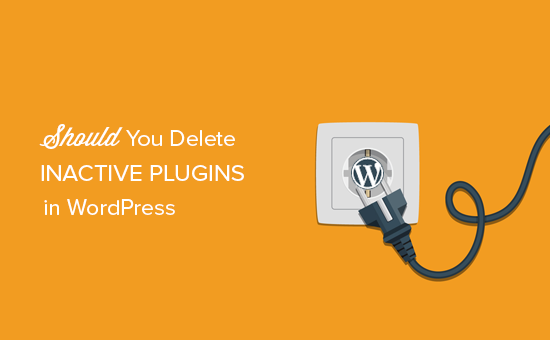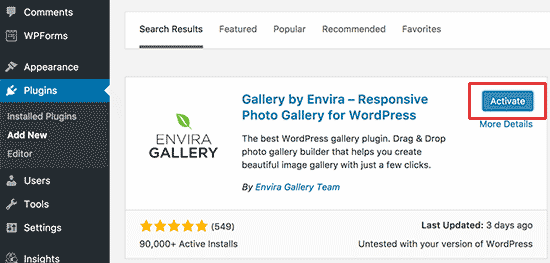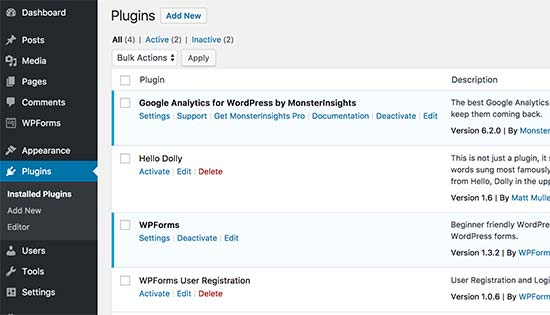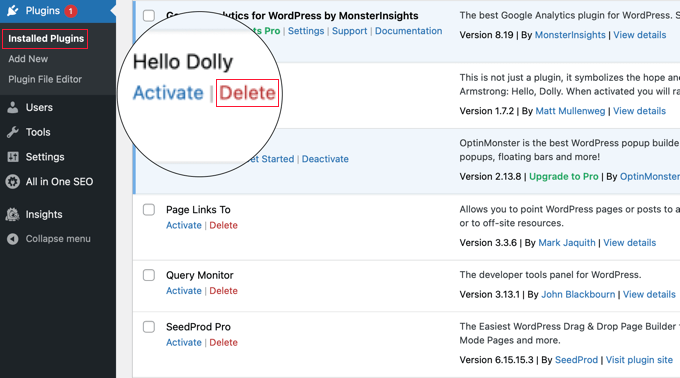Recently, one of our readers asked us about deactivated plugins slowing down WordPress and whether they should delete inactive plugins.
Many WordPress users often install plugins for testing and then deactivate them.
In this article, we will answer the question: do deactivated plugins slow down WordPress, and is it safe to delete inactive plugins?

What Are Deactivated or Inactive Plugins in WordPress?
The best thing about WordPress is that you can extend it using WordPress plugins. When you install a WordPress plugin, WordPress downloads the plugin file to your web hosting server.
In order to start using a plugin, you will need to activate it.

You can install plugins and activate them later.
You can also deactivate a plugin that you tried but didn’t find useful. You can see all your installed plugins (both active and inactive) on the Plugins page in the WordPress admin area.

Active plugins are highlighted in blue, and inactive plugins show a ‘Delete’ link below them.
Do Inactive Plugins Slow Down WordPress?
No, inactive or deactivated plugins do not slow down WordPress. To understand that, let’s see how WordPress works behind the scenes.
Each time a user requests a page from your WordPress site, WordPress starts a loading process. During this process, it only loads active plugins installed on your website. All inactive plugins are totally ignored and are not loaded or even looked at.
Even if you have dozens of inactive plugins installed on your WordPress website, they won’t affect the performance of your site or make it slow.
The only time WordPress looks for inactive plugins on your site is when it loads the ‘Installed Plugins’ page in your WordPress admin area. Even then, it only looks for the plugin’s header file and does not load the plugins themselves.
If your WordPress site is slow, then inactive plugins are definitely not the reason. You may want to check out our step-by-step guide to speed up WordPress and boost performance.
Should I Delete Inactive Plugins in WordPress?
The reason why WordPress allows you to deactivate plugins instead of directly deleting them is that sometimes you may just want to switch off a plugin temporarily.
If you plan to use that plugin soon, and you fear that deleting the plugin will delete its settings, then you should keep it.
Otherwise, there is really no point in keeping the inactive plugins installed on your website. In fact, they can be quite problematic at times.
For example, whether or not you are using that plugin, WordPress will still show you updates for those plugins. This can be a bit annoying, particularly if you have many regularly updated plugins installed on your site.
Inactive plugins can be harmless, but they are still executable files. In case of a hacking attempt, these files can get infected or can be used to install malware on your site.
As a WordPress security precaution, you should delete any inactive plugins that you do not intend to use. You can learn how to do this in our beginner’s guide on how to properly uninstall a WordPress plugin.

Expert Guides on WordPress Plugins
Now that you know how inactive plugins affect your website, you may like to see some other articles related to best practices for plugins in WordPress.
- What Are WordPress Plugins? And How Do They Work?
- Beginner’s Guide: How to Choose the Best WordPress Plugin
- When Is It Worth It to Buy Premium WordPress Plugins? (Explained)
- How Many WordPress Plugins Should You Install? What’s too many?
- How to Properly Update WordPress Plugins (Step by Step)
- Should I Update WordPress or Plugins First? (Proper Update Order)
- Is It Safe to Use Outdated WordPress Plugins? (Explained)
- Should You Install Plugins Not Tested With Your WordPress Version?
- WordPress Plugin vs Functions.php file (Which is better?)
We hope this article helped answer your questions about deactivating WordPress plugins and deleting inactive plugins. You may also want to see our guide on how to track visitors to your WordPress site or our expert pick of essential WordPress plugins to grow your website.
If you liked this article, then please subscribe to our YouTube Channel for WordPress video tutorials. You can also find us on Twitter and Facebook.





Syed Balkhi says
Hey WPBeginner readers,
Did you know you can win exciting prizes by commenting on WPBeginner?
Every month, our top blog commenters will win HUGE rewards, including premium WordPress plugin licenses and cash prizes.
You can get more details about the contest from here.
Start sharing your thoughts below to stand a chance to win!
Mrteesurez says
Another thing is that inactive plugins when they are more can take of space on your server and also all folders therein are counting to your hosting Inode limit. It’s better to disactivate and removed or deleted away. thanks.
Dennis Muthomi says
Speed and performance is not a reason for me to remove them.
But, I have made it a habit not to keep unused plugins installed for security reasons. Even inactive plugins can potentially pose vulnerabilities if they become outdated or infected.
Totally agree with the recommendation to fully uninstall plugins you are not using rather than just deactivating.
Jiří Vaněk says
Thanks for confirming my theory that inactive plugins are ignored by WordPress. In my practice, I don’t keep unused plugins on WordPress. Not because of speed, but precisely because of the potential risk of vulnerability. Basically, thanks to this article, you have confirmed that I am doing it right. Thank you for the information.
Dayo Olobayo says
Thanks for clearing this up… I always thought inactive plugins might be slowing things down, but it’s good to know that’s not the case. However, I will be more mindful of keeping my plugin list clean to avoid any security vulnerabilities.
WPBeginner Support says
Glad we could clear up that common misconception
Admin
Mrteesurez says
For me, the reason why I keep inactive is for a fear of if plugin will be available for download again. It has happened to me twice, I got to the plugin directly to download the plugin but no find it again (has been removed or stopped).
Although, this day I don’t usually keep them much as I would have downloaded the plugin files on my system in case I later need it or it’s elements.
thanks.
WPBeginner Support says
You’re welcome and there’s nothing wrong with downloading the file off your site instead of keeping the plugin inactive on your site
Admin
Chris says
HI,
I have deactivated a few plugins but have not deleted them in case I want to use them later.
But the Updates to these Plugins show up on my Dashboard under the Updates and Plugin tabs.
Is there a way to turn off the notifications for updates to Deactivated Plugins?
Thanks.
WPBeginner Support says
We would not recommend removing the update notification and you should keep the deactivated plugins up to date to keep your site safe.
Admin
Chris says
Thanks for the reply to my question and confirming that deactivated plugins should be kept up to date.
Harwinder Karwal says
Do I lose the database on deactivating a plugin?
Do I get the database after reactivating a plugin?
Any other benefit of the deactivation/activation process of the plugin (s)?
WPBeginner Support says
It would depend on the plugin but you should keep the plugin data when you deactivate a plugin and don’t completely remove it so it would have all of your information when reactivating your plugin.
You would normally only have deactivated plugins on your site if you are troubleshooting a problem or have a very specific need for a plugin for a limited time.
Admin
Mark says
Is there any performance benefit (or problem) in deactivating a plugin that is used to develop your site so for example Elementor or Contact Form 7. It could then be activated if you need to edit later.
WPBeginner Support says
Deactivating a plugin would remove its functionality until the plugin is reactivated. If you’re not using the plugin then deactivating it could help a small amount with your site’s performance.
Admin
rakesh kumar says
I do understand that inactive plugins do not slow-down you website if they are not in a very large number as they have very small footprint in your database, Since the information of the plugin is stored in the database and every time WordPress generate a new page, looks in the database, So according to me if you are not using any plugin then all the traces of that plugin must not appear on your system. If they are there then it should slow-down the website.
Max says
Ok,
but plugin is a piece of code and has weight anyway. Theoreticaly it must slow down the site does it?
WPBeginner Support says
No, it does not. It takes space on your hosting storage but it is not executed. It does not consume any memory to slow down WordPress.
Admin
Luis Daniel Carbia says
Hey, I had this doubt and this article resolved it the correct way: concise and detailed. Thanks!
Jason says
If working on a client’s site, i always like to remove any inactive plugins I do not think we will need to use. That way, your client does not intentionally or inadvertently active any plugin(s) they are not familiar with. Removing inactive plugins also lessens any hacker’s targets.